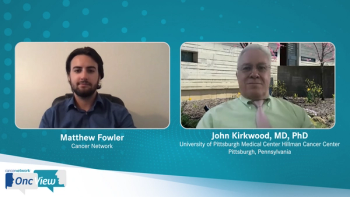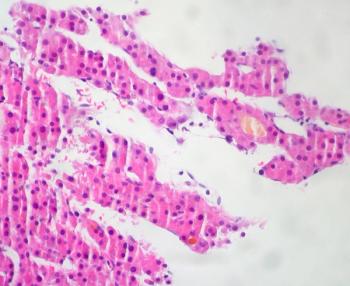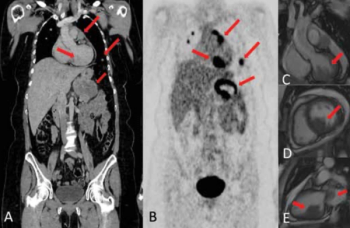
Using ctDNA to Monitor Patients With Melanoma
An expert in melanoma cancer treatment examines monitoring patients with melanoma using ctDNA.

Your AI-Trained Oncology Knowledge Connection!


An expert in melanoma cancer treatment examines monitoring patients with melanoma using ctDNA.

Dr John Kirkwood discusses ctDNA as a new treatment option for patients with melanoma.

John Kirkwood, MD, PhD, addresses the idea of pseudoprogression seen in melanoma therapy.

An expert in melanoma cancer treatment relays the monitoring options for melanoma therapy and gives advice for how long these therapies should be monitored.

A retrospective review identified that clinical practice patterns have changed from 2002 to 2020, with the use of immunotherapy increasing as chemotherapy and radiation therapy use has decreased for patients with Merkel cell carcinoma.

Dr John Kirkwood discusses physician considerations that are examined before immunotherapy use in the treatment of melanoma.

John Kirkwood, MD, PhD, provides an overview of the treatment options for patients with melanoma.

Patients with previously untreated metastatic uveal melanoma who also harbored HLA-A*02:01 and were treated with tebentafusp experienced a longer overall survival compared with the control group of a phase 3 clinical trial.

A subset of patients with metastatic uveal melanoma achieved promising responses after treatment with entinostat and pembrolizumab.

Patients with relapsed/refractory unresectable or metastatic melanoma may derive benefit from alrizomadlin, which has received a fast track designation from the FDA.

Previously treated patients with HLA-A*02:01-positive metastatic uveal melanoma saw survival prediction improvements with ctDNA when compared to RECIST 1.1.

The use of adjuvant pembrolizumab resulted in a recurrence-free survival benefit for patients with resected high-risk stage II melanoma.

Patients with previously untreated metastatic or unresectable melanoma achieved promising benefit following treatment with relatlimab/nivolumab combination therapy.

This clinical quandary discusses oligoprogressive disease in metastatic melanoma and how treatment with immunotherapy and targeted therapy affect the disease.

Tebentafusp has demonstrated promising responses in metastatic uveal melanoma, leading to FDA and European Medicines Agency approval of a biologics license application and marketing authorization application for the agent.

Gut microbes may help to predict adverse effects and outcomes in patients with advanced melanoma who are being treated with dual immune checkpoint inhibitors.

The results from a phase 1 trial that focused on a second cohort of patients with unresectable or metastatic melanoma identified positive safety and promising topline survival outcomes when treated with the combination of UV1 and pembrolizumab.

According to the results of the phase 2 KEYNOTE-629 trial, patients with locally advanced or recurrent/metastatic cutaneous squamous cell carcinoma appear to receive promising anti-tumor benefit from pembrolizumab.

Pembrolizumab met its primary end point of prolonged recurrence-free survival in the phase 3 KEYNOTE-716 trial for patients with stage II resected high-risk melanoma.

Immunotherapy agent nemvaleukin alfa was granted an FDA fast track designation for the treatment of patient’s mucosal melanoma for previously undergone treatment with an anti-PD-L1 therapy.

Cemiplimab for patients with either metastatic or locally advanced basal cell carcinoma showed antitumor activity in a phase 2 trial.

Patients with PD-1 inhibitor-resistant melanoma who were treated with ipilimumab plus anti–PD-1 therapy saw significantly better long-term responses than those on ipilimumab alone.

Bempegaldesleukin plus nivolumab demonstrated positive antitumor activity while maintaining a tolerable safety profile in the PIVOT-02 trial for patients with previously untreated metastatic melanoma in the first-line setting.

Pembrolizumab has been granted an expanded indication by the FDA for locally advanced cutaneous squamous cell carcinoma.

Targovax announced the FDA granted fast track designation to its investigational agent ONCOS-102 for PD-1–refractory advanced melanoma.